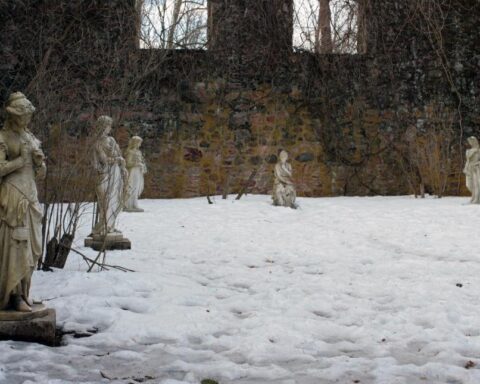Sunlight streaked gently into the dark room through the blinds and settled on the blanket that covered Min-Ju’s curled-up form beneath. She turned sluggishly, raised a piece of the fabric off her head and peered at the clock. 11:04 A.M. Which was the real her, really? This… creature, awakening with the heavy hopelessness that seemed to be the unspoken condition of existence, or the one who could get up and carry on despite it, even if doing so felt like pretentious fakery, a sad theatre? Even the furniture, in their neutrality of presence, seemed to mock her. She drew the blanket over her head again, pulled herself into fetal and squeezed her eyes shut, but sleep didn’t return. Instead, the jagged, disturbing knowledge of the accumulating wasted mornings bore down on her, like boulders rolling down a mountain slope.
She could hear Hyejin moving about upstairs; her sister’s disoriented footsteps moving from the bed, evolving into more determined ones as she went through the business of starting the day: the teeth-brushing, gargle and spit, no-nonsense shower, breaking-bite off an apple’s flesh in the kitchen. “Miiiinn,” Hyejin implored, putting on her heels by the doorway.
“Uhhhnghh?” Min-Ju responded from beneath the covers; hair over her face, some in her mouth.
“Get up. Have breakfast. Go for a run, take your Ipod with you. Go see a comedy film. Take a walk after. Rinse the green beans, and we’ll stir-fry them for dinner.”
“Uhngh-huhngh,” the creature beneath the covers mumbled. Hyejin wondered which task this was a response to.
“I’ll see you later. Get up.”
Another murmur from her sister and Hyejin, shaking her head, left the condo. Min-Ju heard the door close and the lock turn. She was alone. The furniture, in their neutrality of presence, seemed to mock her.
Hyejin’s exhortations were her personalized version of the same thing Dr. Chung recommended Min-Ju create: structure. She thought about trying Hyejin’s proposed version, but she couldn’t bear the manufactured artifice of it. It felt fake, ritualistic and business-like; like some manufacturing process from How It’s Made, end product a shiny new human being. Didn’t Dr. Chung, MD – especially PsyD – hear of the saying all structures are unstable?
The other option, though, was the abyss. There was still yet that other option too, unspeakable yet ever frequent in her mind, but Min-Ju didn’t think she could go through with that either. It would be like killing her Appa too, who wanted nothing more than to garden, see his daughters and read. A curious sight Mr. Kim was now, sitting cross-legged and bespectacled in the library, with his dense beard and Blue Jays’ cap; a man in quiet forgiveness and acceptance that his younger years could have been more wisely spent learning. “How is your writing coming, sweet heart?” he would ask Min-Ju, as if it were something inevitable and supposed to happen; a matter of fact as sure as springtime. Min-Ju knew this was formed from a belief in and a love for her that she couldn’t fathom and even if she tried to, she could picture herself collapsing from within. She too, was after all a structure, able to be brought down by silent, invisible forces.
It was only when Min-Ju felt like her body was feeding on itself that she got up from the sofa. She went over to the glass doors that led to the balcony, parted the blinds and peered outside – a recent, solitary tendency she didn’t quite know the reason for. What she knew now, though, was that her childhood suburbia was a prison, this prostitute of a city was all about money and people were malleable monkeys, conveniently conditioned by cultures they were conceived into – caring only for and clustering in those communities; clueless and comfortable.
Min-Ju heard the door lock turn and the door creak open. A lightswitch was flicked on and a swash of light flowed into the living room. “You remember Min-Ju, right?” she heard Hyejin say in Korean. Min-Ju looked toward the doorway, bewildered.
A girl, a teenager of about sixteen, was standing near Hyejin as they both pushed off their shoes. Min-Ju squinted, trying to figure out who this was. The girl was the effortless and envy-inducing slimness of youth, with porcelain-smooth skin and soft, acquiescent hair tied back in a sensible ponytail. “Ye,” the girl said, smiling enthusiastically, causing the word radiant to form in Min-Ju’s mind. Min-Ju, suddenly aware that her own hair was a wild, tangled mess and that she was wearing sweats and sweat, decided that she would shake the hand of this girl, who evidently knew of her, instead of approaching her to offer a smelly hug. She rose, walked toward Hyejin and the girl and offered her hand.
“Hello,” she said.
“Anyoung hashimnikka,” the girl said, bowing as she took Min-Ju’s hand. Min-Ju was startled. Oh right; she remembered: ‘respect’. Multiculturalism policy talked about Respecting Each Other’s Differences. What the hell was respect, anyway?
And now Min-Ju had a new responsibility: show Song-Yi, the sisters’ new guest and cousin visiting from Seoul, around their city. Song-Yi would be staying for three weeks. As they sat around the coffee table near the sofa, eating the pineapple pizza Song-Yi’d eagerly requested on the way from the airport, Min-Ju discovered that she would have to show Song-Yi the city, and not so much her city.
And so a gloomy Min-Ju and an excited Song-Yi zoomed up the CN Tower then dipped injeera bread at an Ethiopian restaurant. They sailed to the Toronto islands then noodled at Jatujak Thai. After wandering through the U of T’s sprawling gothicism and the ROM and Ryerson’s quirky modernism, they walked down Bloor to Fresh Vegetarian Restaurant. They had biryani at a Pakistani joint before trekking at Bluffer’s Park. And all the while, as a spirited Song-Yi oohed in wonderment, camera-flashing at architecture, markets, Earth formations and colorful cultural festivals – even jamming with subway musicians – Min-Ju was in tumult. Outwardly she was the patient guide standing by, presenting herself and the city’s attractions dutifully to Song-Yi, but capital-P Present she wasn’t.
On the second night of the second week of Song-Yi’s stay, Min-Ju couldn’t bring herself to finish the warm, tzatziki-dipped pitas that she and her cousin had taken out. She was disgusted with herself, even as she had taken the first two bites and tried to maintain some semblance of Presence with Song-Yi. It was the incident at the bus stop earlier. To ESL-hampered Song-Yi, it initially looked like a man quarrelling with a woman, the latter accepting it with a sheepish what-am-I-going-to-do-with-him smile. The man’s words, though, became so ugly and abusive that Min-Ju herself felt wounded. Song-Yi had edged closer to Min-Ju, locking her arm in her cousin’s as thoughts of speaking up clenched in Min-Ju’s mind, but just as suddenly – and almost simultaneously – a thought of the man’s violent reaction flashed in Min-Ju’s mind, causing her to freeze. His shaven, tattooed head and bulging forearm veins didn’t help either. A streetcar pulled up with an oblivious, melodic chime and the man and woman entered it. It wasn’t the car the cousins were waiting for but they may as well have entered it too, because the whole scene stayed with Min-Ju for the rest of the day, upsetting her even more because she realized how pathetic she’d become. Now, back at the condo, comforting carbohydrate was an indulgence she couldn’t let herself continue with. Putting the pita down and leaving Song-Yi dozing on the sofa, she went up to her room, opened a drawer and pulled out a stack of paper: that discontinued novel Appa always asked her about. In frustration, on the blank side of one page, Min-Ju wrote:
“You did not say anything to that man, Min-Ju. You should have.”
Things were easier written than done for Min-Ju. During euphoric World Cup fervor in the city streets, Song-Yi requested taking in a match among fans to experience the festivity. Infest-ivity, more like, Min-Ju thought. Still, she took her cousin to a pub where Portugal versus Italy was airing. Upon seating, the cousins’ waitress – after some idle chatting – went on a rambunctious pro-Italy hurrahing, which inevitably meant a cackling Portuguese bashing. It was a horrid juxtaposition Min-Ju’d seen throughout her years in this city; the simultaneous reverence for one tribe and disdain for another. Folks only differed in degree of subtley about it. Min-Ju, already sensitive to shutting up, wanted to call the woman an idiot but the waitress continued on so raucously in conviction that Min-Ju again pictured aggression and slapping – a scene in her mind acutely intense and worse, believable. These scenes were already occuring in the world and Min-Ju believed it would really happen here should she say anything. And so, she did not.
Later:
“That waitress’ tirade was ugly and you could have called her out on it. You left her in ignorance. This is what fear does, Min-Ju.”
At the end of each day out in the city with Song-Yi, Min-Ju continued to write to herself things she knew she could have done or said in response to the injustices of the day. It is the little things that kill and this was self-survival now: either she act with courage when courage was called for, or continue on in a fearful state; rotting away. She wouldn’t let herself live with the prospect that silence in injustice is the same as siding with it.
~
At the airport on the day of Song-Yi’s departure, Min-Ju held back tears as her cousin dissolved through the doors to the departure gates, waving back at the sisters. Their cousin had embodied a free, exuberant spirit and a genuine liking of Min-Ju’s company, unwavering even when Min-Ju thought her own depression was obvious and affecting. Some days later, as the sisters were having dinner, Min-Ju commented that Song-Yi was one of her favourite people. Hyejin, slurping soon tofu soup, smiled to herself, happy her sister now had favourite people – and that Min-Ju was now venturing out of the condo.
But if Song-Yi had put bandages with kisses on Min-Ju’s wounds, her leaving peeled them off. Those wounds, still hosting maggots of Min-Ju’s troubles, regressed her into her depression; some days she’d sit on her bedside, chin propped in her palm and continuously thinking nothing makes sense. Multiculturalism masqueraded as meritorious; malevolence masked as benevolence – the power and the people mutually masturbating for money. Standing in a crowded streetcar, bleary-eyed and holding onto a pole, Min-Ju thought that if anyone had been observing her, they would gauge her as a sorry, sad, lonesome woman. A man coughed absently into a handkerchief; another person as-absently rustled a newspaper. Min-Ju wondered if passengers would object inwardly to her being on the streetcar, because you-can’t-trust-those-melancholy-mental-types. At least my hair’s alright, she thought. Out of an obligation to appear somewhat transit-normal, Min-Ju raised the folded newspaper she was holding and looked at its words. A few paragraphs into the piece, she was struck with a realization: not only was she reading, but she was also experiencing, mentally, what was on the page. Pointedly noticeable that was, because focusing was something she struggled to do while heavy with depression and anxiety. The article detailed the discovery of the intertwined skeletons of a Neanderthal and a human, theorized to be an embrace of mutual acceptance.
Later that night:
“Min-Ju: Humanity supports you; at least, the idea of them observing you. It adds quality to your composure and actions and it will heal you.
Live as if humanity is watching, Min-Ju. It will lift you up (because you are very much identified with despair). It will help you to recognize beauty as well; e.g., with the musicians today.”
Earlier, whilst making her way through Finch station, Min-Ju had heard the sound of two subway musicians: a cellist and a violinist playing together. The music was the raw aching beauty of humanity itself, rousing and moving inside her something strong and pure; a deep longing for every one to live according to such a sound. She suddenly felt her senses crack open by an abrupt awareness of subway commuters around her. Awestruck, she watched the the moving flesh, limbs and noisy, colorful Earthiness of the limber and fragile human forms before her; the pristine, shining Present. Min-Ju stood that way for a while before straightening up and approaching the musicians to place change inside the open cello case. She smiled to the men. “Thank you,” she said, before walking away. Hell may be other people, she thought, but so is Hope.
With urgent, tunneling need, Min-Ju continued writing herself into moving, functioning life; intelligent design and evolution now married. Personalities of the employment days were now unfamiliar to her: Sunday’s loveliness, the concrete Mondays, the quietly despairing Tuesdays and Wednesdays, Thursday’s hindering irrelevance, Friday’s cheerful triumph, the unshackled Saturdays. Min-Ju wrote down ways she could have better acted throughout those days; she wrote down all her mistakes then and those that she could remember since childhood. She wrote down – and owned – her misdeeds and unkindnesses, forgiving herself for them one by one, in humility. She wrote down the names of those who wronged her and forgave them; forgiving herself, too, for her complicity. She called those writings The Forgiveness Files.
And according to what she wrote, learned in settings both social and solitary, Min-Ju started to do. Washed in suffering and now scrubbed anew by her writings, every movement in each moment felt intimate and new, a discovery in the doing. She straightened her posture after two years of existing in slumped mode. She helped laden commuters carry their grocery bags and smiled happily with the drivers of streetcars and buses, chatting on occasion with them. More than one driver insisted she ride for free. She formed friendships with seniors and schoolchildren at the community gym and she helped students with homework at the library. She ate consciously; savoring fruit in a pure, essential way like she hadn’t before and she groomed herself without indecisive pretension. And likewise, so Min-Ju carried on. In the trains, she found that looking away from the young men whose eyes she met hurt her more than it probably did them – it hurt humanity. So one morning on her way to an interview, Min-Ju smiled then winked at one young man, who broke out in a shy grin before looking down at the floor. Looking up again, he winked back, grinning. The subway car was almost full, but just the two of them were Present. Whatever ill a boy did to a girl, and a girl did to a boy, it was all forgiven.
~
At the interview in the ESL center, the school’s principal held up Min-Ju’s application, peering down at it through thick-rimmed glasses. “There is a three-year gap on your résumé,” she pointed out, looking at Min-Ju, waiting.
“That,” Min-Ju said carefully, drawing a breath in before a wide grin broke out across her face, “that was when I did the greatest work of my life.”




